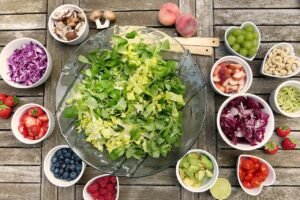 Being on a tight budget can be frustrating, but even more so if you are also trying to improve the nutrition of your food ands tick to a healthy diet.
Being on a tight budget can be frustrating, but even more so if you are also trying to improve the nutrition of your food ands tick to a healthy diet.
It can be done, but it does take a bit more strategy and planning. Here are some tips for eating healthy no matter what your food budget is.
1. Eat More Plant-Based Foods
The plant-forward way of eating involves eating more foods that come from plants, and less that come from animals. If you can start implementing this into your lifestyle, you will save money since meat, poultry, and seafood tend to be among the most expensive food ingredients.
This isn’t about going vegan or completely plant-based, but having your meat and poultry products more of a side dish on your plate, with the cheaper plant-based foods as the main course.
2. Shop Your Kitchen First
Always start with your own kitchen first when you are looking to stick to a tight food budget, but still want to eat a healthier diet. You probably have some ingredients you can use up in your refrigerator, freezer, or pantry. Start with ingredients that are going to expire soon so that they don’t go to waste. You can then consider any pantry staples that would work for healthy meals, like beans or rice, canned vegetables, or meat in the freezer.
3. Choose Cheaper Cuts of Meat
When you do want to eat meat or poultry in your diet, go for the cheaper cuts of meat. For example, chicken and turkey are typically less expensive than red meat like your steak and pork. When you do want red meat, go for ground beef or flat steaks like flank steak. These are tougher cuts of steak, so they work best when sliced thin and used for tacos or fajitas.
4. Be Smart When Buying Produce
Fruits and vegetables are an important part of a healthy, balanced diet, but it is easy to spend more than necessary. To avoid this, start by buying produce that is currently in season. This might vary based on where you live, but for example, summer produce often includes peaches, strawberries, watermelon, carrots, zucchini and tomatoes.
You can also look for year-round produce that tends to be cheaper for most of the year than other produce. This includes lemons and limes, apples, oranges, potatoes, and lettuce.
5. Buy Foods in Their Whole Forms
Always buy foods in their whole, unprocessed forms when you can. Not only is it better for you, but it will also be cheaper in most cases. Get your beans dry and rice in the bags that you need to rinse or soak first before cooking. Never buy produce pre-cut or packaged, and use bulk bins whenever possible for beans, rice, nuts, and seeds.
6. Keep it Simple
You don’t need to use fancy ingredients or expensive organic foods for a healthy diet. Keep your meals and snacks simple and well-balanced, going for affordable ingredients to put together nutritious meals.